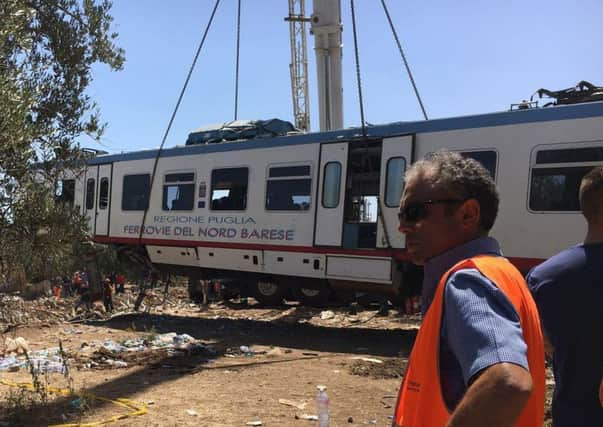Italy train crash: Inquiry begins, death toll expected to rise


Recovery operations continued yesterday using a crane and an extra locomotive to remove the mangled cars and debris of the two commuter trains that slammed into one another just before noon in southern Puglia on Tuesday.
The official death toll stood at 23, including a farmer working his fields who was killed by flying debris from the crash. The prefect of Barletta, Clara Minerva, said relatives reported another four people unaccounted-for and suggested that their remains had been scattered within the wreckage, particularly in the area of highest impact.
Advertisement
Hide AdAdvertisement
Hide Ad“Some remains have been recovered, and on these DNA and other tests are under way,” Ms Minerva said.
As a result, transport minister Graziano Delrio put the provisional death toll at 27.
Local officials said that of the 51 people originally hospitalised, 27 have been released. Seven of those still hospitalised are in critical condition.
Ms Delrio confirmed that the particular stretch of track did not have an automatic alert system that would engage if two trains were close by and on the same track. Rather, the system relied on stationmasters phoning one another to advise of a departing train.
The phone system “is among the least evolved and most risky ways of regulating railway circulation,” Ms Delrio told parliament.
Andria mayor Nicola Giorgino said the crash was particularly tragic and “paradoxical” as work was to begin within a few months to build a second track on the route.
Work was supposed to have begun years ago, and EU funding was secured when it was first proposed for the 2007-13 period. The EU Regional Development Fund had approved 62 per cent of the massive investment into the north-Bari rail improvement that included a second track for the Corato-Andria line – but it was never built.
Mr Delrio did not explain why, but noted that Puglia officials had secured funding for the 2014-20 budget and that bidding for contracts was to have begun on 19 July.
Advertisement
Hide AdAdvertisement
Hide AdTrani prosecutor Francesco Giannella said the delay in the track-doubling work would be part of the investigation. “We will investigate on the delays of the work on the line and on the deficiencies in the security system,” he said.